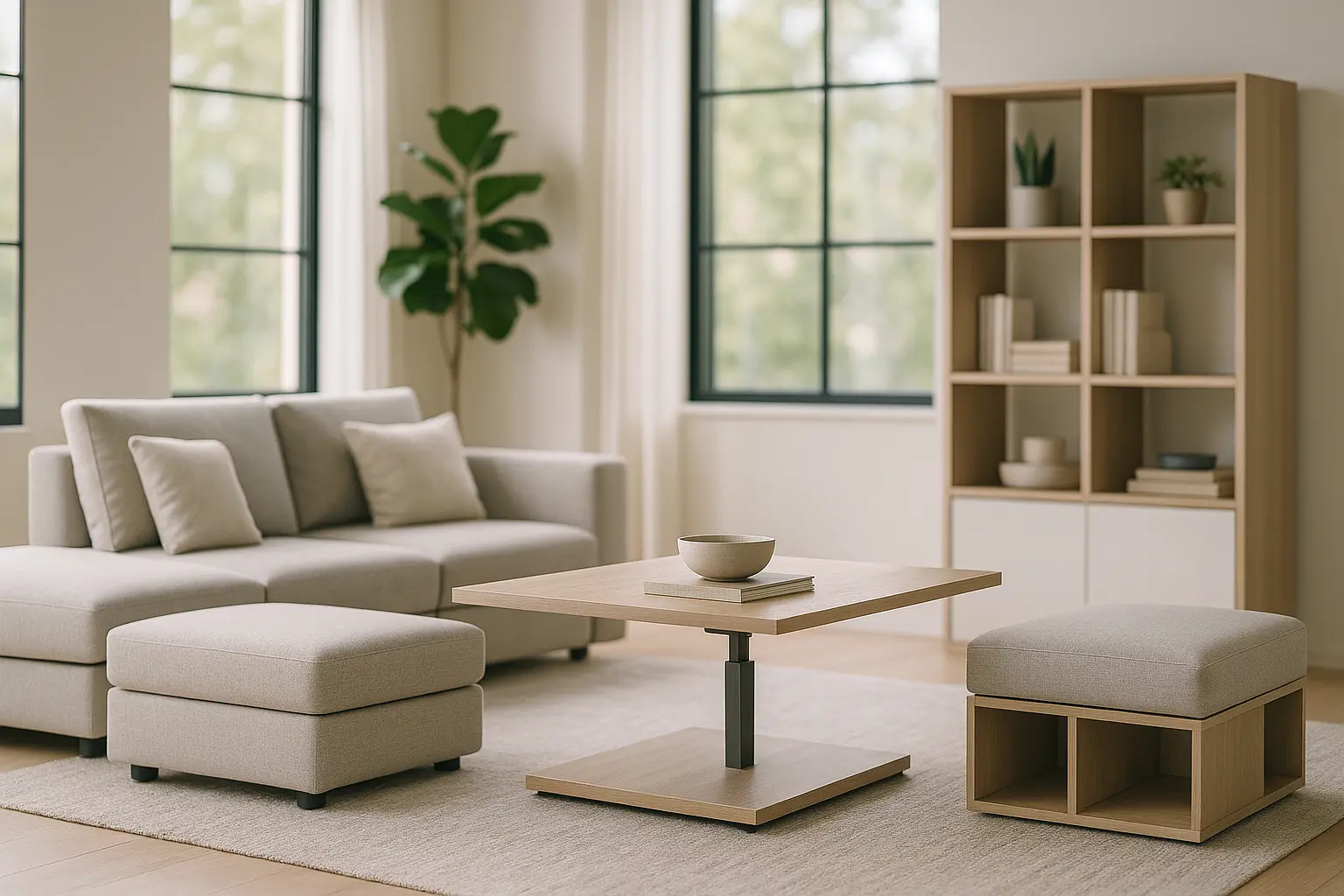In today’s dynamic homes and offices, the demand for versatile and functional furniture has never been higher. We face challenges: limited space, shifting design trends, and evolving needs. Modular furniture emerges as a beacon of modern design, offering solutions that are as flexible as our lifestyles. Let’s explore how modular pieces redefine interiors, creating harmonious living environments that blend style and practicality.
The Art of Modular Design: Crafting Spaces with Intent
Modular furniture is not just about fitting a piece into a room; it’s about crafting an experience. Each module acts as a building block, offering a canvas for creativity and self-expression.
Versatility Meets Aesthetics
At the heart of modular design is versatility. Imagine a sofa that morphs into a bed, or a dining set that transforms into a workspace. Such flexibility means each piece is more than a static item—it’s an evolving solution that responds to our changing needs.
Personalizing Living Spaces
Our living spaces are a reflection of who we are. With modular furniture, the possibilities are endless. Create bespoke arrangements that suit your personal taste, leverage multiple configurations, and ensure that every piece of furniture tells a story unique to you.
Sustainability in Design
Sustainability is paramount in today’s design philosophy. Modular furniture champions this cause by reducing waste through adaptability. Instead of discarding entire sets, we can modify or add modules to fit new spaces or styles, saving resources and minimizing environmental impact.
Seamless Integration
Whether in a cozy living room or a bustling office, modular furniture offers seamless integration into any environment. Its adaptable nature encourages a free flow of ideas and activities, enhancing the functionality of spaces without compromising on style.
Modern Modular Solutions: Redefining the Office Environment
In the realm of modern workspaces, modular furniture is a game-changer. As the nature of work continues to evolve, the need for adaptable and efficient office environments has become paramount.
Encouraging Collaboration
Gone are the days of rigid office layouts. Modular furniture fosters a culture of collaboration, allowing teams to reconfigure spaces for meetings, brainstorming sessions, or solitary work. The result? A dynamic office environment that adapts to the flow of work.
Space Optimization
In bustling urban centers, space is often at a premium. Modular furniture maximizes every square foot, offering solutions like movable walls, multi-purpose seating, and adaptable desks that accommodate changing needs without compromising on comfort.
Flexibility in Design
As remote work becomes commonplace, the lines between home and office blur. Modular solutions offer the flexibility to create personalized home-office setups, ensuring comfort and productivity. With style at the forefront, these pieces blend seamlessly into any aesthetic, from industrial chic to minimalist elegance.
Future-Proofing Workspaces
Investing in modular furniture is an investment in the future. As businesses grow or evolve, modular pieces can be adjusted, expanded, or repurposed, ensuring that office environments remain relevant and functional over time.
Living Room Dynamics: Modular Sofas and Seating
Our living rooms are the heart of our homes, spaces where we relax, entertain, and create memories. Modular sofas redefine this space, offering unmatched flexibility and style.
Tailoring Comfort
Each modular sofa is an invitation to tailor comfort. Whether you’re hosting a movie night or enjoying a quiet evening, these seating solutions can be rearranged to suit any occasion, ensuring every guest has a spot.
Blending Form and Function
Modular seating isn’t just about looks; it’s about function. With options for storage, adjustable components, and convertible sections, these sofas offer more than meets the eye, maximizing the functionality of any space.
Adapting to Lifestyle Changes
Our lifestyle needs evolve, and so should our furniture. Modular sofas are perfect for growing families, downsizing, or simply changing tastes. Add a section, remove a piece, or change the layout entirely—it’s all possible with modular design.
Aesthetic Freedom
From contemporary minimalism to vibrant bohemian vibes, modular sofas come in an array of styles and colors. They provide the perfect opportunity to inject personality and flair into a room, all while maintaining a cohesive and stylish aesthetic.
Conclusion: Transforming Spaces with Modular Ingenuity
As we navigate the ever-changing landscapes of our homes and offices, modular furniture stands as a testament to ingenuity and adaptability. It empowers us to reimagine spaces, offering a harmonious blend of form and function. By embracing these versatile solutions, we not only enhance our living environments but also future-proof them against the evolving demands of modern life. Whether it’s a vibrant living room or a dynamic office, modular furniture ensures that our spaces remain as flexible and innovative as we are.
FAQ
What is modular furniture and how does it differ from traditional furniture?
Modular furniture consists of individual pieces that can be configured in various ways to suit different needs and spaces. Unlike traditional furniture, which is usually fixed in design and function, modular pieces offer flexibility, allowing users to rearrange them as desired.
What are the primary benefits of using modular furniture in modern homes?
The main advantages include adaptability to different spaces, ease of reconfiguration, and the potential for personalization. Modular furniture is especially beneficial for maximizing space in small homes and can evolve with changing lifestyle needs.
How does modular furniture contribute to sustainable living?
Modular furniture supports sustainability by minimizing waste. As needs change, parts can be swapped or rearranged, extending the lifespan of the furniture. Additionally, many modular designs use eco-friendly materials that further reduce environmental impact.
Can modular furniture fit into both residential and commercial spaces?
Yes, modular furniture is versatile enough to be used in both residential and commercial settings. Its adaptability makes it ideal for offices, co-working spaces, and homes, providing solutions that can be tailored to specific functional requirements.
Are there any limitations to using modular furniture?
While modular furniture offers many benefits, there are some limitations. It may not suit everyone’s aesthetic preferences, and certain designs might not offer the same level of comfort or stability as traditional furniture. Additionally, the initial investment can be higher, though it often pays off in the long term due to its durability and adaptability.


